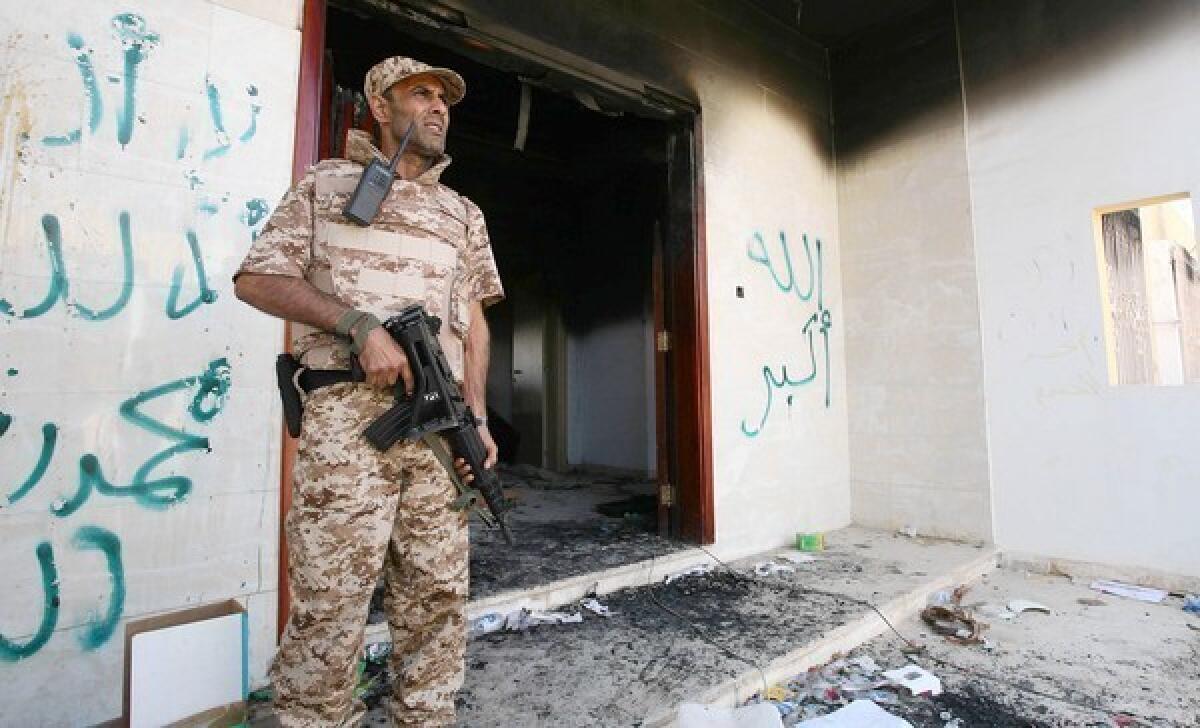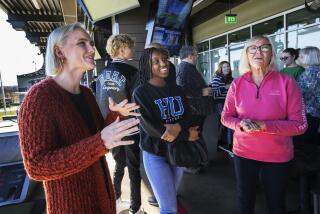CIA’s exit from Benghazi, Libya, draws criticism from ex-officers

- Share via
WASHINGTON —- About a dozen CIA personnel were evacuated from eastern Libya after heavily armed men stormed the U.S. Consulate in Benghazi and killed four Americans, setting back an important intelligence operation and prompting a debate about how much risk CIA officers should assume in dangerous overseas posts.
The decision to withdraw the team from Benghazi drew criticism from former CIA officers, who called it an overly cautious response to the Sept. 11 attack, which killed two security officers, an information technology officer and the U.S. ambassador, J. Christopher Stevens.
The critics drew analogies to Syria, where the U.S. closed its diplomatic mission. The CIA has sent few if any operatives there despite policymakers wanting clarity on the conflict. The agency has relied on local informants, other foreign intelligence services and technical systems to collect intelligence in Syria.
In Benghazi, CIA operatives were working from a diplomatic compound. Their mission included identifying and tracking extremist militants and searching for surface-to-air missiles missing since Libyan ruler Moammar Kadafi was toppled and killed last year.
For now, those efforts have been curtailed.
“This is really disgraceful,” said a former CIA station chief with three decades of Middle East experience. “Why spend billions of dollars a year on the intelligence service and then run away right at the moment when you most need intelligence?”
The CIA declined to comment. A U.S. official, speaking about intelligence matters on condition of anonymity, described spying since the attack as “challenging” but said U.S. agencies have “not lost the bead on key targets that might threaten U.S. and Libyan security interests.”
Others said the CIA is already planning to reestablish an operation in Benghazi.
“Benghazi has played a key role in the emergence of the new Libya, and it will continue to do so,” a U.S. intelligence official said. “It makes complete sense that U.S. officials would return to continue to build relationships and help the Libyans secure their future.”
Former officials said the evacuation was justified given the dangers in Benghazi, traditionally home to Islamist militants, including some affiliated with Al Qaeda. The former officials said the CIA may have left operatives behind under deep cover or, more likely, Libyan agents who can operate more easily without detection.
“If you’ve got 10 or 12 guys living in a house in eastern Libya somewhere, that’s a target, and there’s no way 10 or 12 guys are going to hold off a militia,” a former CIA manager said. “Our tendency has been, if there is a problem, we pull out. Yes, we have stay-behind plans, but we rarely execute those kinds of plans because of the risks” that an American could be captured.
Ambassador Stevens and State Department information management officer Sean Smith died apparently from smoke inhalation during the attack, U.S. officials have said. Glen A. Doherty and Tyrone S. Woods, two former Navy SEALs who were working as security contractors for the U.S. mission, were killed later when mortar rounds were fired at a consulate annex.
FBI agents are in Libya investigating the attack, and the U.S. intelligence community can listen to phone calls, hack into email traffic, conduct overhead surveillance and otherwise spy in Libya. But face-to-face meetings usually provide the best information, former CIA officers say.
A former CIA officer who served in Iraq and Afghanistan said it should be possible for agents to operate relatively safely in Libya by traveling in small teams with Arabic-speaking officers.
“Look, the risks are somebody could get killed. Somebody could get grabbed. There could be terrible videos on the Internet,” he said.
“This is the job. This is what we do. If we are going be relevant in a place like Libya, we’re going have to take the risk,” he said.
More to Read
Sign up for Essential California
The most important California stories and recommendations in your inbox every morning.
You may occasionally receive promotional content from the Los Angeles Times.














